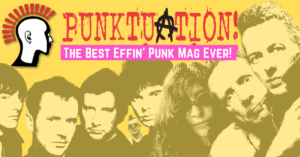The DJ, filmmaker and musician talks about the huge impact punk has had on his life and reveals some of the stories from his must-read autobiography There And Black Again
Don Letts is in a reflective mood. Sat in the smart shed that serves as his home office, an old-school ghetto-blaster looming in the background, he’s considering the twists and turns that put him at the centre of the 1970s London punk scene and its infatuation with reggae.
It was a time when his loves of music, film and fashion become inextricably intertwined, forming the foundation of a rich career.
Now a Grammy award-winning DJ, filmmaker, musician and punk icon, Letts looks relaxed in a track suit, aided by an occasional crafty smoke. He’s chatting to music academic and author Dr Jennifer Otter Bickerdike for an online Rough Trade Q&A event.

When animated, Letts’ hands blur on the Zoom screen as he discusses his latest autobiography, the newly-released There and Black Again. Each chapter begins as a short movie scene and in print Letts doesn’t so much drop names as spray them from a Tommy Gun, as Chrissie Hynde, Chris Blackwell, Paul McCartney, Patti Smith and Chuck D, to name but a few, make their entrances.
The book describes how Letts pinballed from rock to soul to disco to reggae to punk, soaking up music, film and culture like a sponge as he continued his lifelong mission to keep learning. The son of Windrush parents, he also lays bare the ongoing racist insults he faced and the way he felt like he had to push down certain aspects of his personality.

“It’s just been this weird duality of my existence to have to suppress myself and not make people realise that I know a lot more about them than they know about themselves or me. Because when I went to school, I listened to what they taught me, and invariably I know a lot more about white culture than white people do – and they know diddly-squat about me, so I’m deadly,” he tells Otter Bickerdike.
“I was first-generation British-born Black, which kind of rolls off the tongue now, but it was a confusing concept back in the day.” Don Letts
Tweet
“Society made me this way – I was first-generation British-born Black, which kind of rolls off the tongue now, but it was a confusing concept back in the day.”
Against this confusion, music was a great unifying force for Letts, particularly on the dance floors of soul clubs and reggae clubs.
“Club culture in this country has played a tremendously important part in uniting the people … much more so than bloody church, state and school.”
In this environment, Letts could express himself freely. “I was never a macho kid, never did the football thing, all I could do was dazzle the girls with my dance moves and my intellect. I was turning my problems into my assets – that’s punk rock!”
“All I could do was dazzle the girls with my dance moves and my intellect. I was turning my problems into my assets – that’s punk rock!” Don Letts
Tweet
But before punk really made its entrance into Letts’ life, he had two musical epiphanies. The first in 1971 when, aged 14, he stumbled on a free show by The Who at the Young Vic theatre in Waterloo that opened his eyes to rock music.

“I was 10 feet away from the stage, and that moment opened this world to me that set me on a trajectory to where I am today and it’s a testament to the power of music, man. Somebody once said to me that music doesn’t affect change, it only reflects change. Bollocks!”
His other key show tapped into the sense of belonging he had already found in reggae. Bob Marley at London’s Lyceum Theatre in July 1975, captured on the Live! album, was “the closest I ever got to a religious experience”, he notes in his book.

“People forget that music has that potential to be a tool for social and personal change, man.” Don Letts
Tweet
Expanding on this he tells Otter Bickerdike: “I walked out of there a changed man. He helped me to be all that I could be – I didn’t just walk out of there a fan, he sent me on a quest. People forget that music has that potential to be a tool for social and personal change, man.”
One such galvanising force for Letts was punk, specifically “the late incarnation of punk in the UK in the ’70s”. Ever the cultural historian, he’s well aware of the music that predates bands like the Sex Pistols.
“England just gave it a look, which is important in our world,” he says, adding: “The things that I learnt back then still serve me on a day-to-day basis today. I’m not talking about mohawks and safety pins I’m talking about how the punk attitude and spirit has informed everything that I’ve done.”

It also added new context to his collection of albums by Marley, Tappa Zukie, Jah Woosh, Big Youth and others. “Meeting these crazy white kids back in the day, made me understand the punk in my own culture. For instance, the creation of reggae was kind of punk rock. The guys couldn’t do all that fancy Eric Clapton stuff, [but] they could hold a chord and do a skank and they turned that into an art form.”
“Meeting these crazy white kids back in the day, made me understand the punk in my own culture. For instance, the creation of reggae was kind of punk rock.” Don Letts
Tweet
Early punks like Lydon and Paul Simonon were already big reggae fans. Those that weren’t would soon be exposed to the music when Letts started DJing at London’s first punk club The Roxy in Covent Garden in December 1976.

Few proper punk singles had been released at that point, so between the bands, Letts would spin dub reggae. Then, when the club closed for the night, he’d host late-night parties back at his place in Forest Hill.
“I’d literally be sitting in my living room and there’d be Strummer and Lydon and The Slits and The Adverts and X-Ray Spex and Subway Sect and some of the Banshees, all at the same goddamn time. And it was just a thing back then. It sounds ‘wow’ now, but then we were just doing a thing.”
His time at The Roxy would also see him take to roaming the dancefloor with a super 8 camera, capturing early live footage of The Clash, Generation X, Siouxsie and the Banshees, Johnny Thunders And The Heartbreakers. It would form the bedrock of The Punk Rock Movie, his first documentary.
A lot of his super 8 footage also features in the Hear to Be Heard documentary about The Slits, who he briefly managed.
“I’m really proud of having the opportunity to work with The Slits. Having said that, they were particularly fucking out there, it has to be said. There was only one Arianna, man. I mean, nobody could handle The Slits, including me.”
The last of the original wave of punk bands to be signed, Letts sees their debut album Cut as signposting the way for post-punk.
“I’d literally be sitting in my living room and there’d be Strummer and Lydon and The Slits and The Adverts and X-Ray Spex and Subway Sect and some of the Banshees, all at the same goddamn time.” Don Letts
Tweet
He was also involved in another of the great post-punk bands. After the Sex Pistols split Letts travelled to Jamaica with John Lydon for a trip that saw them flown out by label boss Richard Branson and meet with reggae royalty (it’s one of many fascinating stories in his book). On their return Lydon formed Public Image Ltd (PiL) and Letts was asked to shoot his first video for their debut single, Public Image.
“I was totally out of my depth there, because everything I’d shot before then was me with my little super 8 thing,” he says. But for the Public Image video he had to have a union crew and tell people what to do.
“To be honest with you, the only reason that video has any gravitas is because of John’s performance.”
Looking back on the way reggae informed and influenced punk, and the beautiful mutations that came after that first wave of ’77 in London, Letts is keen to put it in its place.

“Nothing comes out of a void – there’s an interaction that’s constantly fluid and going on between all contemporary music. That punky reggae thing just started a process. It wasn’t so much about just punk rock and just reggae, it was about being open-minded. And I think the more intelligent end of the band spectrum have been embracing that for fucking ages.”

Now 65, his new book is an opportunity to re-examine his past and chart how much musical ground he covered. But the tragedies of 2020 also bleed into the pages. The US police killings of Breonna Taylor and George Floyd, and Covid’s disproportionate impact on Black people, see Letts draw the book to a close with contradictory thoughts running around his head.
“This whole ‘black’ thing? I’m fucking tired of that burden man. I just want to be Don Letts and get on with my shit. But the reason the book’s called There and Black Again is because society won’t let me, or us.
“But then, considering what I’ve achieve in spite of that, could the world survive the complete Don Letts? I don’t know, because I’ve done a fair amount of shit – so imagine, if I were allowed to be just me from the get-go, what I could have achieved. But it ain’t been a bad ride and I’m still standing man – I ain’t going nowhere.”
Follow Don Letts On His Socials
Need more punk shit to read?
An occasional writer on punk rock.
Click on Dom’s photo for more of his articles





 Did you know that we are 100% DIY? We run our own game. No one dictates to us, and no one drives what we can or cannot put on our pages – and this is how we plan to continue!
Did you know that we are 100% DIY? We run our own game. No one dictates to us, and no one drives what we can or cannot put on our pages – and this is how we plan to continue!
